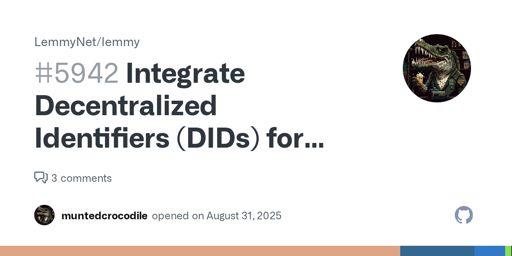Here’s an idea to make Lemmy even better: true account portability.
Right now, your Lemmy account and all your content are tied to one server. Moving instances or having one shut down means losing your digital presence. Frankly, the server controls your online identity.
But what if you controlled your identity?
I’ve opened a discussion on the Lemmy dev GitHub about integrating Decentralized Identifiers (DIDs). Think of a DID as a permanent, global ID you own, independent of any server.
Why DIDs are a game-changer for Lemmy:
- Real Account Portability: Move your entire account – posts, comments, followers – to any new instance seamlessly. Your identity travels with you.
- More User Control: Your online presence becomes resilient, managed by an ID you control, not governed by a single server’s policies.
- Proven Tech: It works. Protocols like ATProto (Bluesky) successfully use DIDs for portable user identities.
- Full Fediverse Compatibility: We can add DIDs to Lemmy while staying fully interoperable with Mastodon, Kbin, and all other ActivityPub platforms. No breaking changes, just a powerful upgrade.
This is a big step towards a more decentralized and user-controlled fediverse. If you’re interested in more control over your digital self, check out the discussion:
[GitHub Issue: https://github.com/LemmyNet/lemmy/issues/5942]
If you’re on other ActivityPub platforms, consider pushing for similar solutions! The more platforms that adopt truly portable identity, the stronger the fediverse becomes.



Where is that virtual actor hosted? If it’s centralized, I feel like it defeats the purpose of user-centric identity control. If it’s user-hosted, that sounds like GPG with extra, even more inconvenient steps.
Its both. It can we a json file served from some webserver. It can be a peer hosted thing where a bunch of instances host it on your behalf. It can be something that exists on your designated identity server. It can be a transaction on a blockchain. And as long as the software knows how to resolve it they all work.
Having to figure out hosting, no matter if it’s self, peer, or whatever else hosting, kinda makes this proposal DOA I think. It’s kinda using a jackhammer for a problem that’s already been solved by a screwdriver.